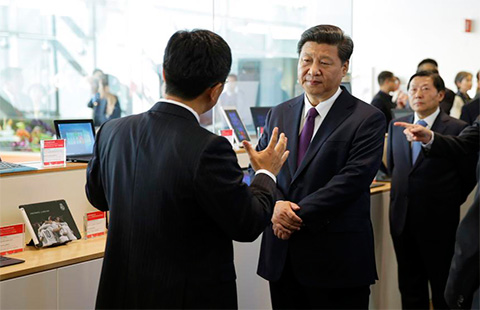Ethnic equality, unity and development in Xinjiang
Updated: 2015-09-25 06:33
(China Daily)
|
||||||||
According to the Constitution of the People's Republic of China and the Law of the People's Republic of China on Ethnic Regional Autonomy, ethnic autonomous areas have the right to enact autonomous and separate regulations to adapt the provisions of the state law, administrative regulations and local regulations in accordance with their local conditions. These stipulations have played an important role in safeguarding the legitimate rights and interests of the ethnic minorities and promoting economic and social development in ethnic autonomous areas.
All ethnic groups are guaranteed the right to use and develop their own spoken and written languages. Xinjiang is a region of multiple spoken and written languages, of which there are ten principal ones. The region has enacted the Regulations for Work Concerning Spoken and Written Languages in the Xinjiang Uygur Autonomous Region, which provides a legal basis for the extensive use of the spoken and written languages of ethnic minorities in such fields as justice, administration, education, news media, publishing, radio, movies, television programs, the Internet and daily life. Government organs in handling public affairs and various other organizations in recruitment and promotion tests all use the language(s) of the ethnic groups exercising autonomy in a given area. Seven languages are used as teaching languages in primary and secondary schools in the region, five languages are used in broadcasting and television programs, and six languages are used in publishing books, audio-visual products and electronic publications.
The Law of the People's Republic of China on the Standard Spoken and Written Chinese Language rules that the standard spoken and written Chinese language is Putonghua (a common speech with pronunciation based on the Beijing dialect) and the standardized Chinese characters. The autonomous region encourages ethnic minorities to study the standard spoken and written Chinese and offers appropriate courses in primary and secondary schools, and it also encourages ethnic minority peoples to study one another's languages so as to enhance mutual understanding and communication. Since 2010, the autonomous region has required that newly recruited civil servants must acquire basic skills in both the standard and ethnic languages before they enter the service, and that they must be provided with opportunities of and conditions for bilingual training.
The customs of ethnic minorities are respected and the freedom of each ethnic group to maintain or reform its own customs is protected. In 2004, the region formulated the Halal Food Regulations of the Xinjiang Uygur Autonomous Region to protect the halal dietary customs of the relevant ethnic groups, which stipulated that departments in charge of ethnic affairs of the people's governments at/above the county level are vested with the responsibility of supervising and exercising control over the production and supply of halal food within areas under their jurisdiction. The region also renders support to and guarantees the production and supply of special supplies to ethnic minorities. Ethnic minorities which have the tradition of inhumation (ground burial) are exempt from the government requirement for cremation, and are allotted special plots for cemeteries. Major festivals of the ethnic minorities are also made official public holidays in Xinjiang. The region encourages all ethnic groups to respect one another's customs while encourages following more scientific, civilized and healthy customs in relation to food, clothing, shelter, transportation, weddings, funerals and etiquettes.
Candidates of ethnic minority origins are selected and cultivated as officials and professionals. A large number of administrative officials and technical professionals from ethnic minority groups have been fostered through training courses and working at the grassroots level, or through work exchanges or job rotation. In 1955, the number of ethnic minority officials in Xinjiang was 46,000, which increased to 417,000 in 2014, accounting for 51.4 percent of the total officials in the region. When selecting leading officials and recruiting civil servants, the autonomous region implements more flexible policies such as setting a recruitment ratio and offering directional recruitment and bonus points in favor of ethnic minorities, so as to make sure that a certain number of ethnic minorities join the civil service. The proportion of ethnic minority civil servants in the total recruitment increased from 29.9 percent in 2009 to 48.3 percent in 2014.
Special support has been given to professional personnel of ethnic minority origins. Since 1992, the state has put in place a special program to train professionals of ethnic minority origins in key areas of science and technology by way of holding training courses, advanced studies, exchanges and being placed on more challenging posts, etc. and by the end of 2014 the region had trained in total 3,917 middle- and high-caliber professionals of ethnic minority origins badly needed in Xinjiang.
- Another corruption suspect repatriated from US to China
- Shanghai slaps three-year ban on entertainers caught doing drugs
- 37 students critical after botched fire drill in NW China
- Man writes Chinese calligraphy using kitchenware
- Brilliant Autumn Urumqi feasting many eyes
- Kids serve as traffic police in C China
- Colombia, FARC reach breakthrough agreement in Havana
- White House prepares for government shutdown
- EU leaders seek unity on refugee plans
- EU pushes through plan to relocate 120,000 refugees amid oppositions
- China, Malaysia conclude first joint military exercise
- Hillary Clinton opposes controversial oil pipeline

 Here's what's on the menu for the state dinner
Here's what's on the menu for the state dinner
 President Xi visits Microsoft campus in Seattle
President Xi visits Microsoft campus in Seattle-
 Xi revisits Lincoln High School after 1993 bond
Xi revisits Lincoln High School after 1993 bond 
 Chinese, US business leaders gather at roundtable meeting
Chinese, US business leaders gather at roundtable meeting-
 Xi visits assembly line of plane manufacturer Boeing in US
Xi visits assembly line of plane manufacturer Boeing in US -
 First Lady tours Fred Hutchson Cancer Research Center
First Lady tours Fred Hutchson Cancer Research Center 
 Boeing to sell 300 planes to China
Boeing to sell 300 planes to China-
 Sino-US ties need more understanding: Xi
Sino-US ties need more understanding: Xi
Most Viewed
Editor's Picks

|

|

|

|

|

|
Today's Top News
Young people from US look forward to Xi's state visit: Survey
US to accept more refugees than planned
Li calls on State-owned firms to tap more global markets
Apple's iOS App Store suffers first major attack
Japan enacts new security laws to overturn postwar pacifism
Court catalogs schools' violent crimes
'Beauty of Beijing's alleys akin to a wise, old person'
China makes progress fighting domestic, international cyber crime
US Weekly

|

|








